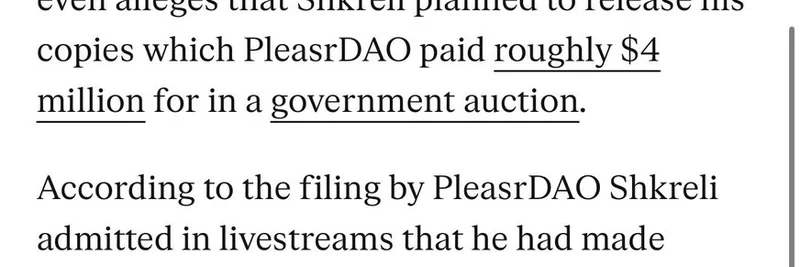In the ever-evolving world of blockchain and crypto, it's always exciting when mainstream media starts to catch on without the usual skepticism. Recently, a tweet from Drew Coffman (@drewcoffman) highlighted just that. He pointed out a snippet from The Verge's article describing PleasrDAO as "a sort of crypto art collective." Coffman called it a "positive step," and honestly, he's onto something. For those in the meme token and blockchain space, this kind of framing could signal broader acceptance of DAOs (Decentralized Autonomous Organizations) and their role in digital art and collectibles.
Let's break it down. The story revolves around Martin Shkreli, the infamous "Pharma Bro" who once jacked up drug prices and landed in jail for securities fraud. Back in 2015, Shkreli bought the sole physical copy of Wu-Tang Clan's album Once Upon a Time in Shaolin for $2 million. The album was designed as a unique art piece—no duplicates, no public release. After his conviction, the U.S. government seized it and auctioned it off. Enter PleasrDAO, who scooped it up for about $4 million in 2021.
Fast forward to this year: PleasrDAO sued Shkreli, claiming he made unauthorized copies and even streamed parts of it, which devalues their exclusive ownership. A judge recently ruled that the lawsuit can proceed on trade secret grounds, forcing Shkreli to hand over any copies he had. Shkreli admitted in livestreams to copying the album and taunting DAO members online. Classic Shkreli move.
What makes this relevant to meme insiders? PleasrDAO isn't just any group—they're a powerhouse in the crypto art scene, famous for buying the original Doge meme image as an NFT for $4 million back in 2021. That Doge NFT basically kicked off a wave of meme token frenzy, inspiring projects like Dogecoin's surge and countless dog-themed tokens. By framing PleasrDAO as a "crypto art collective," The Verge is normalizing DAOs in the public eye, moving away from the "scam" narrative often slapped on blockchain tech.
This positive media shift could boost confidence in meme token communities, where DAOs often govern projects, vote on upgrades, or manage treasuries. Think about how collectives like this pave the way for decentralized ownership of cultural artifacts—whether it's rare albums or viral memes. It's a reminder that blockchain isn't just about trading tokens; it's about preserving and democratizing value in unique ways.
As Coffman replied to his own thread, it's "one small step at a time." If mainstream outlets keep this up, we might see more balanced coverage of crypto innovations, helping newcomers understand the tech without the hype or fear. For blockchain practitioners, stories like this underscore the importance of IP (intellectual property) in digital assets—something meme token creators should keep in mind when building their ecosystems.
Stay tuned for more updates on how DAOs like PleasrDAO are shaping the future of crypto art and memes. If you're diving into meme tokens, check out our knowledge base for tips on navigating DAOs and community governance.

